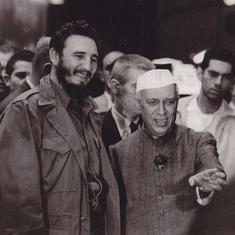The ruling Bharatiya Janata Party and the opposition parties are clearly playing a cat and mouse game with each other over the forthcoming presidential election.
The BJP president Amit Shah has set up a three-member committee, comprising Union ministers Rajnath Singh, Arun Jaitley and M Venkaiah Naidu, ostensibly to consult the opposition to forge a consensus on a candidate’s name. But this exercise is being seen as a formality and an effort by the BJP to prolong the discussions till the end so that the opposition is left unprepared to field its own candidate. The last date for filing nominations is June 28. The Presidential election is to be held on July 17.
The BJP committee has contacted opposition parties, including the Congress, the Communust Party of India (Marxist), the Nationalist Congress Party and the Bahujan Samaj Party, and sought time on Friday for discussions with individual leaders from the rival camp.
Consequently, the 10-member opposition sub-committee, which met on Wednesday to discuss the names of its candidates, decided to take a view on the matter after their round of meetings with the BJP ministers. Leader of opposition in the Rajya Sabha and Congress leader Ghulam Nabi Azad said that because the BJP leaders had contacted them, the overwhelming view at the meeting was to wait for them to name their candidate for the President’s post.
No cause for optimism
The opposition has already declared that they would only support a candidate with impeccable secular credentials who will uphold the Constitution. This point was underlined again at the Wednesday meeting when Rashtriya Janata Dal leader Lalu Prasad Yadav declared, “There can be no ideological compromise with the BJP” – a view which was endorsed by the other members including CPI(M)’s Sitaram Yechury, Janata Dal (U) leader Sharad Yadav, Samajwadi Party leader Ram Gopal Yadav and Communist Party of India’s D Raja.
Opposition leaders were therefore not too optimistic about the possibility of any meeting ground between the two sides, particularly since the BJP-led National Democratic Alliance has the numbers to ensure the election of its candidate. In addition to the National Democratic Alliance partners, the BJP has enlisted the support of the YSR Congress, both factions of the All India Anna Dravida Munnetra Kazhagam and the Telengana Rashtriya Samithi. On its part, opposition leaders have sought the support of Biju Janata Dal Chief and Odisha Chief Minister Naveen Patnaik as they believe it will be difficult for him to do business with the BJP after it emerged as the main opposition party in his home state in the recent local elections.
“The BJP has come this close to having its man – or woman – in the Rashtrapati Bhavan,” said an opposition leader, “why would it forgo this opportunity?” Maintaining that the two sides are locked in a “game of attrition”, he said the opposition is well aware of the BJP’s tactics and is going ahead with its preparations for a contest. “The script is clear – the BJP will say they tried to build a consensus but the opposition insisted on a contest,” said a opposition leader. “We will say the BJP’s candidate was not acceptable to us, so we opted for a political fight,” he added.
Although the opposition has shortlisted several names, there is a growing consensus on the candidature of Gopal Krishna Gandhi, former West Bengal governor and retired bureaucrat. If he is fielded, the opposition will lay emphasis not only on his track record as a civil servant and an intellectual but also on his illustrious lineage. After all, he is the grand son not only of Mahatma Gandhi, but also of C Rajagopalachari. They also hope to capitalise on Amit Shah’s disparaging reference to the Father of Nation as a ”chatur bania” as a way to highlight the BJP’s contempt for the Mahatma.
Inevitable contest
Given the expectations from the proposed talks between the BJP and the opposition, a contest appears inevitable. In fact, except for 1977 when Neelam Sanjeeva Reddy was elected unopposed, other occupants of the Rashtrapati Bhavan had to face an election. Though Reddy’s name was proposed by the Janata Party, the Congress did not put up a candidate since it had suffered a humiliating defeat in the elections that year.
Even India’s first President Rajendra Prasad, who is the only leader to have had two terms, had to contest elections, though he won both times with a huge margin. It has been no different from S Radhakrishnan onwards, as all the presidents, barring in 1977, won after a contest.
In 2002, the then Prime Minister Atal Behari Vajpayee succeeded in creating fissures in the opposition camp when he proposed Kalam’s name for the top post. Several opposition parties, including the Congress and the Samajwadi Party, endorsed Vajpayee’s choice but the Left parties decided to field Captain Laxmi Sehgal despite knowing that it was a mere token fight. Similarly, the Congress was able to wean away BJP allies, Shiv Sena and Janata Dal(U), for the election of Pratibha Patil and Pranab Mukherjee.
It remains to be seen if the BJP will take a leaf from history and succeed in enlisting the support of any of the 17 political parties which plan to use their united fight in next month’s Presidential election as the first step towards the formation of a broader secular and democratic anti-BJP coalition with an eye on the 2019 Lok Sabha poll. Though the BJP is comfortably placed in this election, it will not give up its attempt to divide the opposition, not because it needs its support but to deal a psychological blow to its efforts at forging a larger opposition unity against the saffron outfit.










